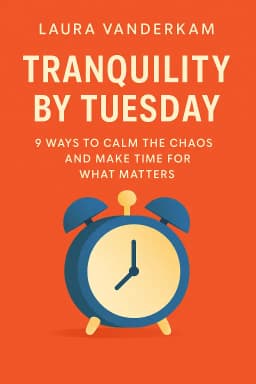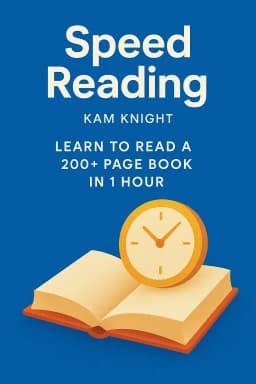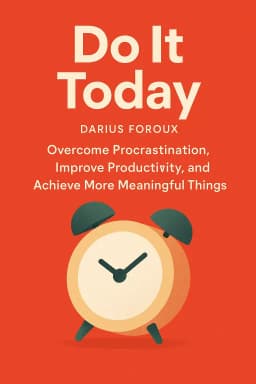
The Joy of Missing Out
Golden Hook & Introduction
SECTION
Mark: Productivity isn't about getting more done. In fact, the most productive people you know are masters of not doing things. They are experts in the Joy of Missing Out. Michelle: I love that. The Joy of Missing Out. It sounds so much better than what I usually have, which is the Fear Of Missing Out, or FOMO. That constant anxiety that I should be doing something else, something more. Mark: Exactly. And that's the radical idea behind Tonya Dalton's book, The Joy of Missing Out. She argues that our culture has it all backward. We celebrate being busy, but busyness is often just a mask for a lack of direction. Michelle: Tonya Dalton... she's the founder of that productivity company, inkWELL Press, right? I've heard she calls herself a 'recovering perfectionist,' which, I have to say, makes me trust her immediately. Anyone who hasn't had a perfectionism-induced meltdown probably doesn't have productivity advice I need. Mark: That’s the one. And her perspective clearly resonated. The book was named one of Fortune Magazine’s Top 10 Business Books of the year when it came out. She’s not just talking theory; she built this entire framework from her own experience of hitting a wall. Michelle: A wall I think many of us are intimately familiar with. Mark: It all started for her on what should have been a perfect spring morning, but instead, she ended up crying on her kitchen floor, completely overwhelmed. And that’s where the first big idea of the book really begins.
The Overwhelm Illusion: Redefining 'Busy' vs. 'Productive'
SECTION
Michelle: Oh, I know that kitchen floor feeling. It’s a specific kind of despair, usually involving cold tiles and the realization that your to-do list has somehow grown three extra limbs and is now chasing you. Mark: That’s precisely it. She describes this beautiful day, sun shining, birds chirping, and she's just dropped her daughter off at preschool. She gets home, looks at her massive to-do list, and just… freezes. She feels paralyzed, and then the tears come. Michelle: What was on the list? Was it launching a rocket to Mars? Mark: Not at all. It was normal stuff. Work tasks, home chores, calls to make. The usual. And that’s when she had her breakthrough realization, which is a core quote from the book: "overwhelm isn’t having too much to do; it’s not knowing where to start." Michelle: Huh. That lands. It’s not the volume, it’s the void. The lack of a clear starting point. You have a hundred doors in front of you, and you can't figure out which one to open first, so you just sit in the hallway. Mark: Exactly. And Dalton uses a brilliant analogy for this state of being, which a member of her community, a woman named Emily, came up with. She said being busy feels like being a marble in a pinball machine. Michelle: Oh, I am 100% the pinball. The flippers are my email notifications and my boss's 'quick questions.' I'm just getting smacked from one glowing bumper to another, racking up points that don't actually mean anything at the end of the day. Mark: Right! There's a lot of light and noise and motion, but you have zero control over your direction. You're just reacting. Productivity, on the other hand, Emily described as having a road map. You know your destination, point B, and you're intentionally navigating from point A to get there. Michelle: That’s such a clean distinction. One is chaos, the other is clarity. But our work culture, our social media, everything seems designed to turn us into pinballs. It glorifies the hustle, the constant motion. Being "busy" is a status symbol. Mark: It is. Dalton says we've confused activity with achievement. We get a little dopamine hit from answering an email, from crossing off a trivial task like 'buy paper towels.' It feels like we're moving, but we're just bouncing around inside the machine. We're not actually going anywhere meaningful. Michelle: And that feeling of being a pinball, of being constantly reactive, is what leads to that kitchen floor moment. It’s the exhaustion of motion without progress. Mark: Yes. You spend the whole day being flung around, and at the end of it, you're tired, but your most important work is still untouched. You look back and can't name a single thing you did that truly mattered for your long-term goals. Michelle: Okay, so if being a pinball is the problem, and the solution is getting a roadmap... how do we even begin to draw that map? It feels like the biggest challenge is deciding on the destination. Saying 'no' to the pinball flippers is easy if you know what you're saying 'yes' to. Mark: And that brings us to the second, and perhaps most powerful, idea in the book. It’s about moving beyond simple tasks and finding what Dalton calls your 'North Star.'
The North Star Principle: Ditching the To-Do List for a Legacy
SECTION
Michelle: A 'North Star.' That sounds very grand and poetic. But what does it actually mean in practice? Is it just a corporate-style mission statement for your life? Mark: It's deeper than that. It’s about defining your personal mission, your vision, and your core values so they can act as a filter for every decision you make. And to illustrate why this is so critical, Dalton doesn't use a modern business example. She goes back to the 19th century and tells the incredible story of Alfred Nobel. Michelle: The guy from the Nobel Prize? I assume he had his North Star figured out. Mark: Well, he was forced to. In 1888, Alfred's brother Ludvig died. But a French newspaper made a mistake. They thought it was Alfred who had died, and they published his obituary. Michelle: Whoa. To read your own obituary? That's the stuff of nightmares. Mark: And the headline was absolutely brutal. It read: "Le marchand de la mort est mort." The merchant of death is dead. Michelle: Oh my god. Why? Mark: Because Alfred Nobel was the inventor of dynamite. He had intended for it to be a tool for construction and mining, to make work safer. But it had been co-opted for warfare, and he was seen as a man who got rich from creating more efficient ways to kill people. Michelle: That's devastating. To have your life's work summed up like that. He must have been horrified. Mark: Completely. He was confronted with his legacy in the starkest way imaginable. He realized that despite his intentions, the world was going to remember him as a purveyor of destruction. And that single, horrifying moment changed everything. He decided he had to rewrite his own legacy. Michelle: And that's where the Nobel Prizes came from. Mark: Exactly. He rewrote his will, dedicating the vast majority of his fortune to establishing the prizes, to celebrate those who conferred the "greatest benefit on mankind" in physics, chemistry, medicine, literature, and peace. He architected a new legacy. He defined a new North Star for his fortune and his name. Michelle: Wow. That story puts my daily to-do list—'buy milk,' 'email Steve,' 'schedule dentist'—into a very different perspective. It's such a powerful contrast. We're chasing these tiny, insignificant dopamine hits from crossing off trivial tasks... Mark: ...while Nobel was forced to think about the entire meaning and impact of his life. And that's Dalton's point. The traditional to-do list is a trap. It treats "buy milk" with the same importance as "work on my life's passion project." It's a flat, meaningless document. Michelle: It’s the ultimate pinball machine accessory. It just gives you more bumpers to hit. Mark: Precisely. She advocates for ditching the to-do list entirely and replacing it with a 'priority list.' And the priorities on that list are only the things that directly serve your North Star. Everything else is just noise. Michelle: But let's be realistic. Some critics of this kind of self-help advice say it's not always practical. I still have to buy milk. The kids still need to get to the dentist. How does defining a grand 'North Star' help me on a chaotic Tuesday morning when the dishwasher is broken? Mark: That's a fair challenge. Dalton's approach isn't about ignoring reality. It’s about creating a framework to handle that reality. Your North Star might include 'being a present and caring parent.' In that case, scheduling the dentist appointment is a priority. It serves the North Star. The key is the intentionality. You're not just reacting to a task; you're consciously choosing it because it aligns with your defined values. It changes the 'why' behind the 'what.' Michelle: I see. So it's not about abandoning daily life, it's about filtering it. It helps you distinguish between the tasks that are just 'urgent' and the tasks that are truly 'important' because they build the life you actually want to live. Mark: You've got it. It’s the difference between putting out fires all day and actually building the house.
Synthesis & Takeaways
SECTION
Michelle: So, when you boil it all down, the book is making a much bigger argument than just 'how to be more organized.' Mark: Absolutely. The core argument is that most productivity systems are useless because they start in the wrong place. They give you a better hammer, but they never ask what you're trying to build. You can't truly manage your time if you don't know what the time is for. Michelle: It’s a shift from time management to life architecture. Mark: That's the perfect way to put it. It’s about designing the life you want first, and then using productivity as the tool to construct it, rather than just being a more efficient pinball. It’s about choosing your yeses so powerfully that the nos become easy. Michelle: That Alfred Nobel story is going to stick with me. It makes you wonder... if a newspaper accidentally published your obituary today, what would the headline be? And more importantly, is that the headline you want? Mark: That's a powerful and slightly terrifying question to sit with. But it gets to the heart of it. Dalton suggests starting small. Don't feel pressured to write a perfect, five-page mission statement today. Just start by asking one simple question before you commit to something: "Does this serve my North Star?" Even if your North Star is just a vague direction for now, the question itself starts to build the muscle of intentionality. Michelle: I like that. It’s a small step away from the pinball machine. What’s one thing you’re choosing to ‘miss out on’ this week to make space for what really matters? It’s a great question to ask ourselves. We’d love to hear what you think. Let us know what your JOMO is this week. Mark: This is Aibrary, signing off.









